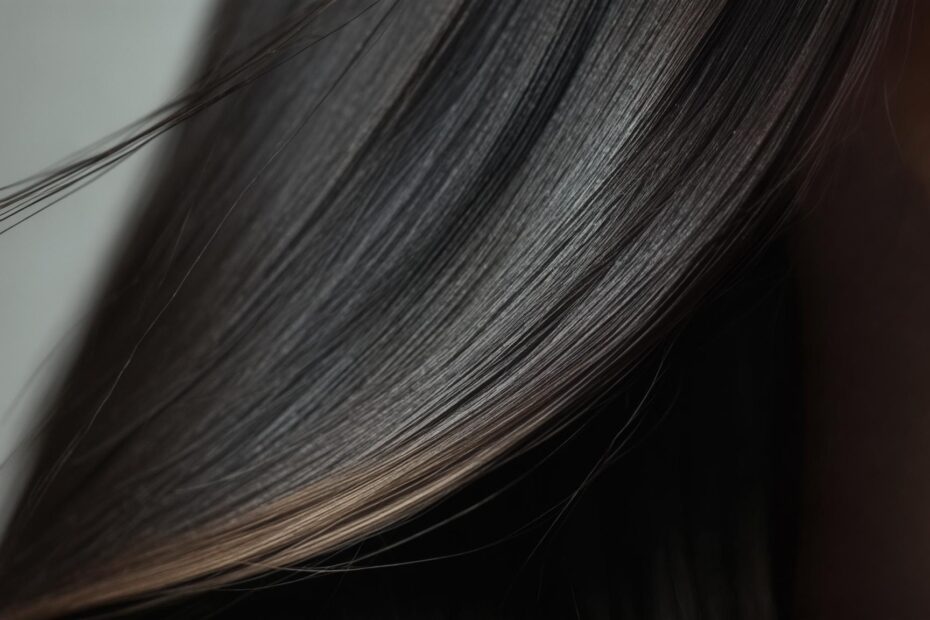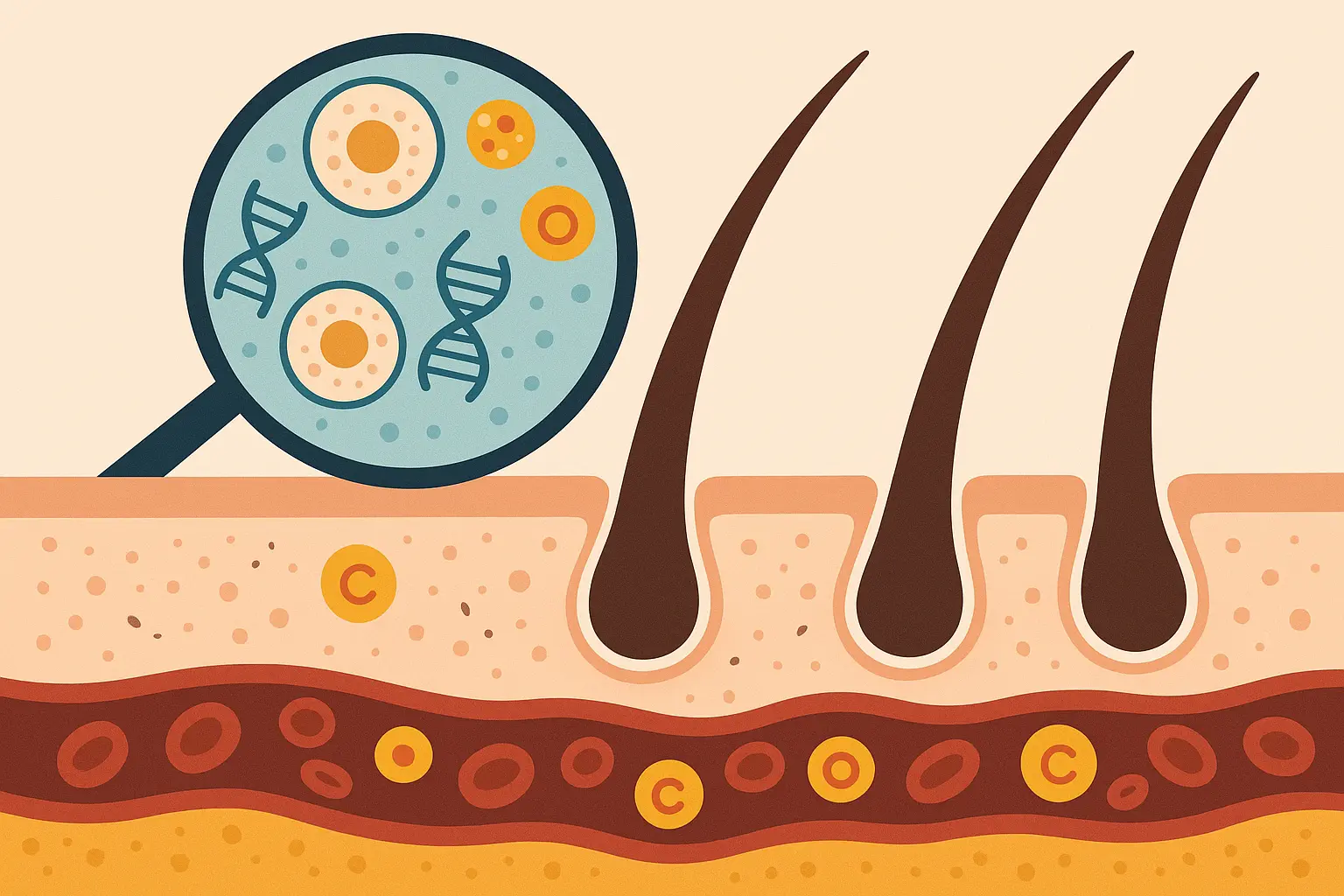
Look, I’ve been digging into the whole B12 and hair thing for a while now, and what I found really caught my attention. Turns out, when you’re low on B12, your hair can really take a hit – but not for the reasons most people think. Studies show that B12 plays a vital role in hair growth through DNA synthesis and red blood cell formation, but here’s where it gets interesting.
Most of us think it’s just about fixing a deficiency, but there’s this whole complex system involving something called methylation pathways, genetic switches, and blood vessel health that nobody talks about. I’ve seen way too many people waste months on those generic B12 gummies from the drugstore while their hair keeps falling out – and honestly, it’s because they’re missing these crucial pieces of the puzzle.
Table of Contents
- The Methylation Mystery: Why Your Hair Follicles Need More Than Just B12
- Your Blood Tests Are Lying: The Absorption Game Nobody Warned You About
- Timing Is Everything: When and How Your Hair Actually Uses B12
- The Supporting Cast: Why B12 Can’t Work Alone for Hair Growth
- Final Thoughts
TL;DR
- B12 works through something called methylation that literally controls your hair genes – it’s way more than just preventing deficiency
- When B12 is low, this troublemaker called homocysteine damages the tiny blood vessels feeding your hair follicles
- Your blood test might say your B12 is fine, but your hair follicles could still be starving
- Hair follicles work on a 48-72 hour cycle, so timing your B12 actually matters
- Injectable B12 bypasses all the absorption problems that make pills useless for many people
- B12 needs backup dancers like folate, molybdenum, and selenium to actually help your hair
- About 40% of people have gene variants that mess with B12 processing
The Methylation Mystery: Why Your Hair Follicles Need More Than Just B12
Here’s the thing – most people think about B12 deficiency like it’s an on/off switch. Either you have enough or you don’t, right? But what’s actually happening at the cellular level is way more complicated and frankly, way cooler.
There’s this process called the methylation cycle that literally controls which genes get turned on or off in your hair follicles. Think of B12 like a key that unlocks your hair growth genes. Without it, those genes just sit there doing nothing, even if everything else looks perfect on paper.
I know this sounds complicated, but stick with me – this is probably why you’ve been frustrated with B12 supplements that don’t seem to work.
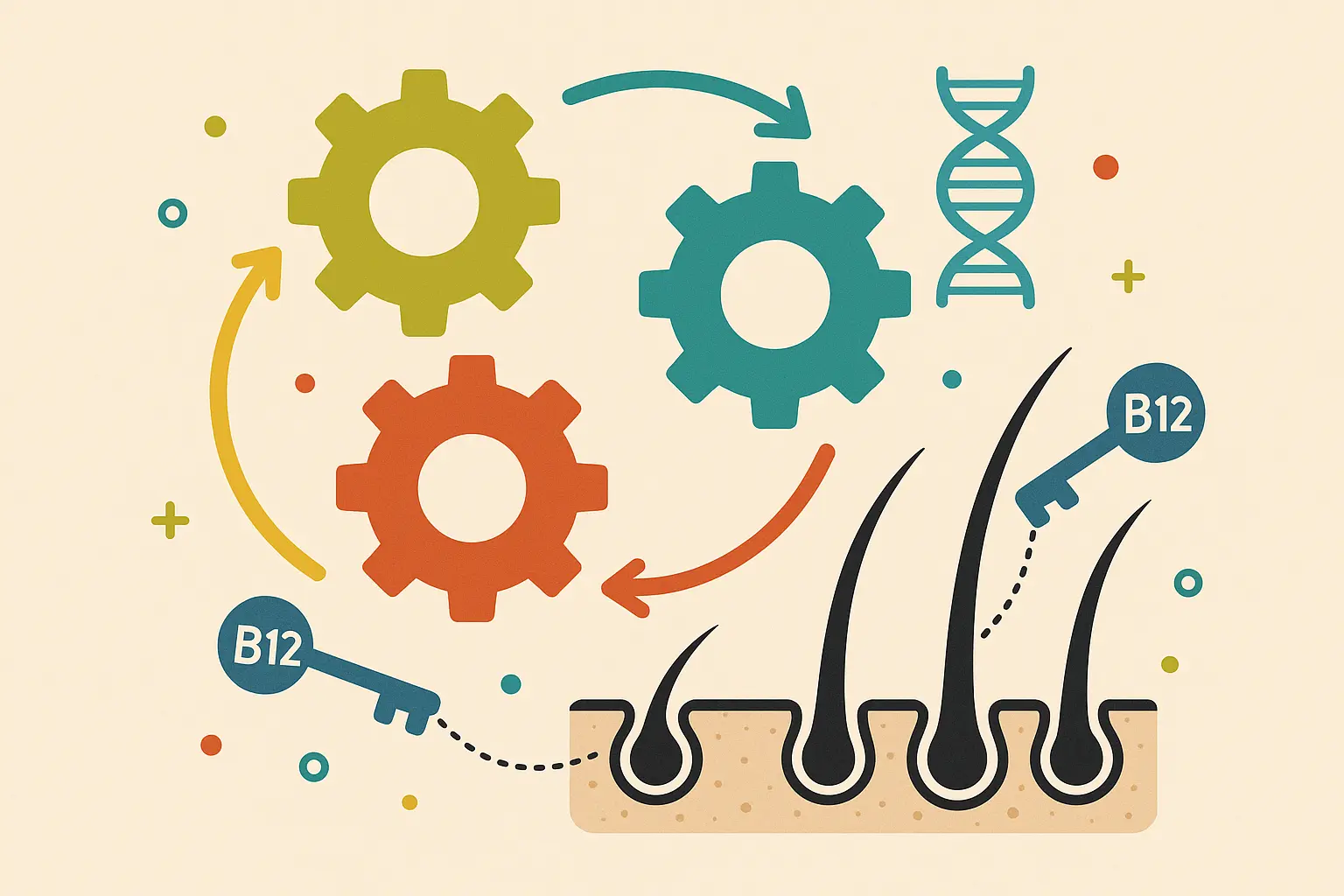
How B12 Actually Controls Your Hair Genes
So here’s what’s really going on. Understanding whether is B12 good for hair requires examining how hypomethylation affects B12 utilization at the cellular level, where your genes can dramatically impact whether your hair can actually use this nutrient.
Your hair follicles have these genes that control growth, but they need to be “switched on” through methylation. B12 provides the little chemical switches (called methyl groups) that flip these genetic switches. When this system isn’t working right, your hair growth genes can literally be turned off – even if you’re eating perfectly and taking all the right supplements.
This might explain why your friend swears by B12 for her hair while you’ve tried it and seen zero results. It’s not that B12 doesn’t work – it’s that your methylation system might not have been the problem in the first place. Research shows that serum B12 levels under 200 pg/mL indicate deficiency, with normal ranges being 500-900 pg/mL, but here’s the kicker – lots of people with “normal” levels still lose hair because of these cellular methylation issues that regular blood tests completely miss.
Why Methylcobalamin Beats Cyanocobalamin Every Time
Okay, so most B12 supplements contain something called cyanocobalamin because it’s cheap and doesn’t go bad sitting on the shelf. But your hair follicles actually need methylcobalamin – that’s the form that can immediately get to work on those genetic switches we talked about.
Here’s the problem: cyanocobalamin has to go through this whole conversion process in your body to become useful, and turns out, a lot of us can’t make that conversion very well. It’s like trying to use a key that needs to be reshaped before it fits the lock.
Let me tell you about Sarah – she’s 34 and took those drugstore B12 tablets for 8 months with zero improvement in her hair. When she switched to methylcobalamin injections (1000mcg twice a week), she noticed way less hair in her shower drain within a month, and by week 12, she had these little baby hairs sprouting along her hairline. The difference? Her body just couldn’t convert that synthetic stuff efficiently, so her hair follicles were basically starving despite all her efforts.
The Homocysteine Problem You’ve Never Heard Of
Now here’s where it gets really interesting. When your B12 levels drop, this amino acid called homocysteine starts building up in your blood. But homocysteine isn’t just a marker – it’s actually a troublemaker that damages the tiny blood vessels feeding your hair follicles.
Think about it like this: your hair follicles are like busy little factories that need constant deliveries of nutrients. Homocysteine is basically vandalizing the delivery trucks and cutting the supply lines. Even if you have all the right nutrients in your system, they can’t get to where they need to go.
Most doctors don’t even test for homocysteine levels, so this hair-damaging process can go on for years without anyone realizing what’s happening.
Your Hair Follicles Are Starving (And You Don’t Know It)
Hair follicles need a constant supply of nutrients delivered through these microscopic blood vessels. When homocysteine damages these vessels, it’s like cutting off the supply lines to a growing city. The follicles can’t get what they need to produce strong, healthy hair, no matter how many supplements you’re taking or how perfect your diet looks.
This vascular damage is often the missing piece when people can’t figure out why their hair is thinning. I’ve seen people with absolutely perfect nutrient panels still losing hair because their homocysteine was quietly destroying their follicle blood supply behind the scenes.
The Inflammation Connection Nobody Talks About
But wait, there’s more. Elevated homocysteine doesn’t just damage blood vessels – it also triggers this chronic low-grade inflammation specifically around your hair follicles. This creates an environment where it’s nearly impossible for hair to grow normally, even when all your vitamin levels look great on paper.
The tricky thing is this inflammation is subtle enough that you won’t feel it, but persistent enough to gradually mess with your hair’s growth potential over months or years. Ever wonder why your hair seems to get progressively worse despite trying everything? This hidden inflammation might be the real culprit.
Why B12 and Folate Are Joined at the Hip
Here’s something that really blew my mind when I learned about it. The relationship between B12 and folate becomes even more complex when folate metabolism dysfunction creates additional barriers to proper methylation, requiring approaches that address both nutrients at the same time.
B12 and folate work together in that methylation cycle I mentioned earlier, and you really can’t optimize one without thinking about the other. When B12 is low, folate gets “trapped” in a form your cells can’t actually use. This creates what’s called a functional folate deficiency that directly impacts DNA synthesis in those rapidly dividing hair follicle cells.
This is why sometimes people see hair improvements with folate supplements, even when their B12 levels seem fine. It’s all connected.
| B12 Status | Folate Utilization | Hair Follicle Impact | What I’d Try |
|---|---|---|---|
| Deficient | Trapped/Unusable | Severe growth disruption | High-dose methylcobalamin + methylfolate |
| Low-Normal | Partially blocked | Slow growth, more shedding | Moderate B12 + folate support |
| Optimal | Fully functional | Normal growth cycle | Just maintenance dosing |
| Excess | May mask B12 issues | Variable, depends on B12 status | Balance both nutrients |
The Methylfolate Trap That’s Sabotaging Your Hair
This biochemical trap happens when folate gets stuck in a form your cells can’t use because there isn’t enough B12 to complete the methylation cycle. Your folate blood levels might look perfect, but your hair follicles are experiencing a functional folate deficiency.
Breaking this trap requires adequate B12 in the right form, which is why fixing your B12 can sometimes resolve what looks like a folate-related hair problem. I’ve worked with people who had excellent folate levels but terrible hair until we got their B12 sorted out – suddenly their folate could actually do its job.
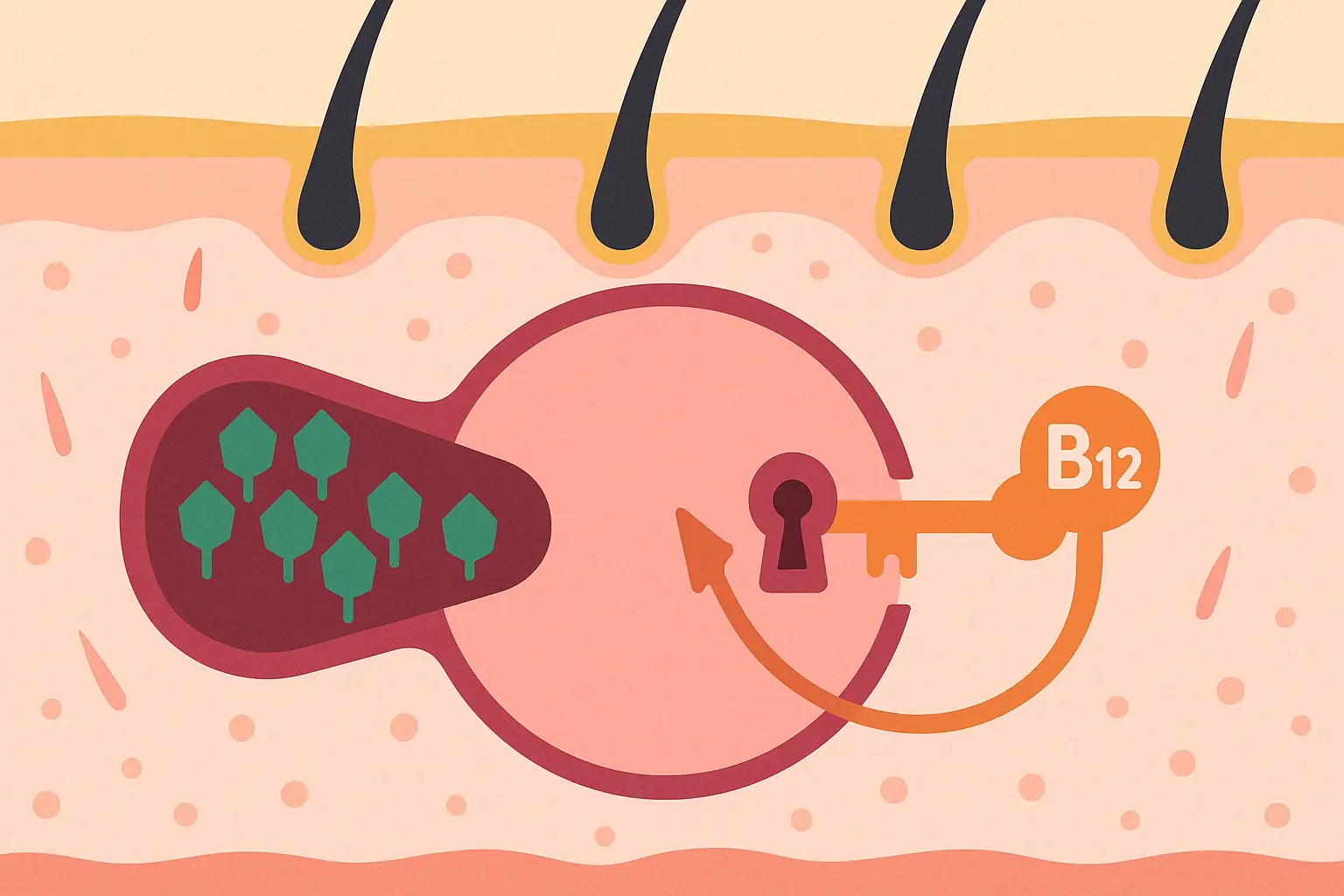
Your Blood Tests Are Lying: The Absorption Game Nobody Warned You About
Okay, this is where most people get really frustrated, and I totally get it. Your blood test says your B12 is fine, maybe even high, but your hair is still falling out. What gives?
Serum B12 tests are notoriously unreliable for figuring out what’s actually happening at the cellular level. Your blood might show normal or even high B12 levels while your hair follicles are literally starving for it.
Here’s the thing about hair follicles – they’re like the dramatic teenagers of your body. They have really high metabolic demands and are often the first place to show B12 deficiency symptoms because they’re rapidly dividing cells that your body considers “non-essential” for survival. Recent coverage in “Health Shots” reveals that “vitamin B12 deficiency is linked to increased hair loss” and that “insufficient levels of vitamin B12 can often lead to weak and broken hair that falls off too easily,” but what they don’t mention is how normal blood levels can still mean starving hair follicles.
Why Injections Work When Pills Don’t
When you’re thinking about starting B12 injections, it’s important to understand how injectable delivery bypasses all the absorption issues that make oral supplements pretty much useless for many people dealing with hair concerns.
Hair follicles need consistent, high-level B12 availability that those pills from the pharmacy often just can’t provide. Injectable B12 bypasses all the potential problems in your digestive system and delivers the active form directly to your bloodstream where it can actually get to work.
For hair health specifically, this delivery method can literally make the difference between seeing results and wondering why you’re wasting your money.
The Gastric Bypass Effect (Even If You’ve Never Had Surgery)
Here’s something most people don’t realize – you don’t need gastric bypass surgery to have B12 absorption problems. Things like acid-blocking medications (those purple pills for heartburn), getting older and producing less stomach acid, or autoimmune conditions can all mess with your ability to absorb B12 from food or supplements.
Your hair often becomes like an early warning system for these absorption issues because follicles are so metabolically demanding. I’ve seen people taking massive oral B12 doses with zero improvement until they switched to injections – suddenly their hair started responding like it was supposed to all along.
The Cellular Transport Problem
But even if B12 gets into your bloodstream, it still needs to get into your actual cells through these specific transport proteins. If you’re deficient in these transport proteins, you can have cellular B12 starvation even when your blood levels look totally normal.
Hair follicles are particularly vulnerable because of their high metabolic rate and constant need for all those B12-dependent processes we talked about earlier.
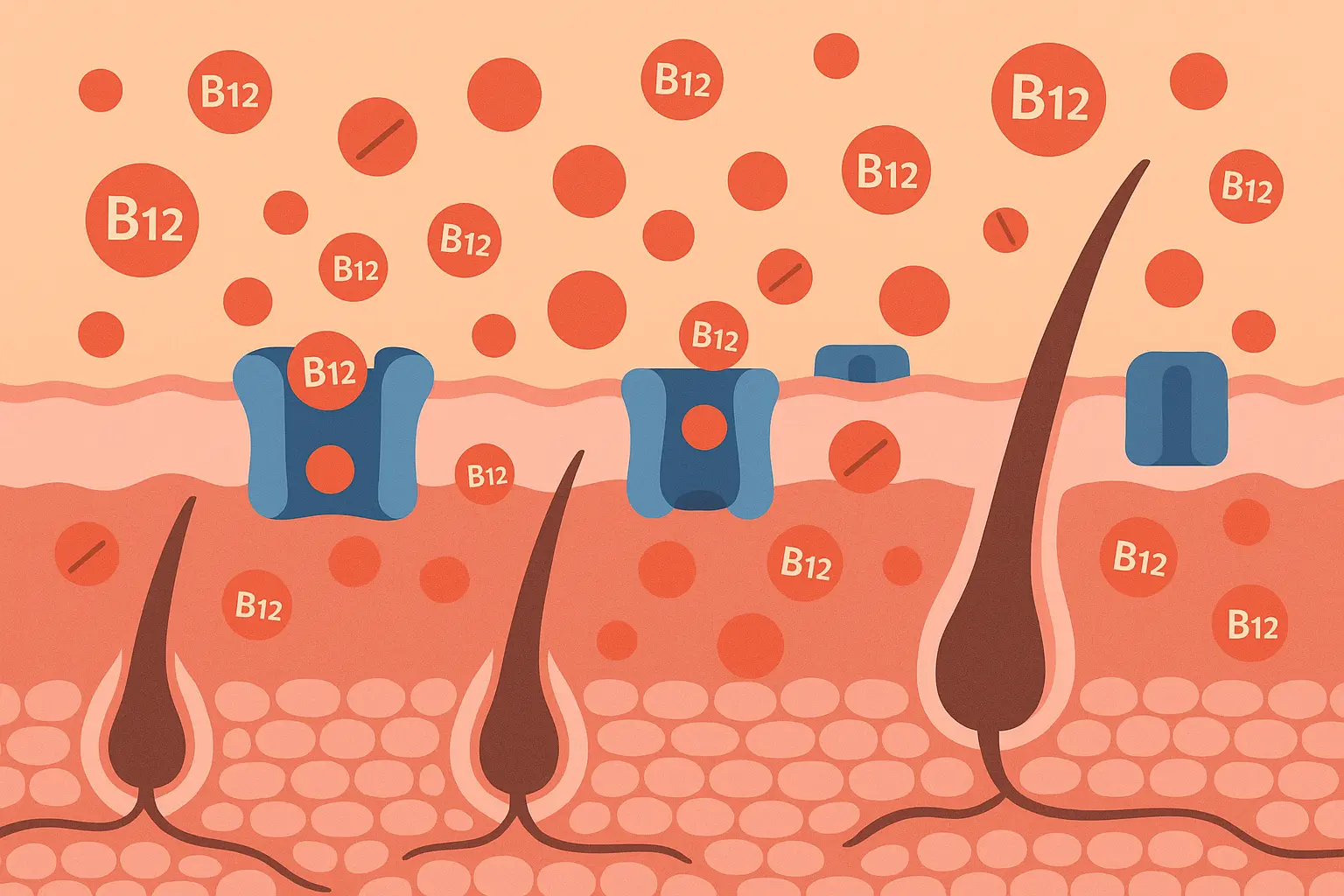
Your Genes Might Be Working Against You
The role of genetics in personalized healthcare becomes really important when you realize why some people need way higher B12 doses to get the same results, especially for hair health.
MTHFR gene variants affect up to 40% of us and can create functional B12 deficiency that hits rapidly dividing cells like hair follicles first and hardest. If you have these variants, you might need much higher doses of the active form of B12 to get the same cellular effects as someone with “normal” genetics.
This genetic factor explains why some people need really aggressive B12 therapy to see hair improvements while others respond to lower doses. Studies show that the recommended daily B12 intake is around 2.4 mcg for adults, but those with deficiencies may need up to 1,000 mcg daily until levels normalize, with maintenance doses of 25-100 mcg after that. That’s a pretty dramatic difference between preventing problems and actually fixing them.
The Aging Factor Nobody Wants to Discuss
As we get older, our cellular B12 uptake mechanisms become less efficient. It’s like the cellular machinery starts getting rusty. When your body starts rationing B12, hair follicles are among the first to be cut off because they’re not essential for keeping you alive.
This age-related decline can begin as early as your 30s and might explain why hair problems often get worse with age, even when B12 blood levels stay stable. I’ve noticed this pattern over and over – people in their 40s and 50s whose hair suddenly starts thinning despite having stable lab values for years.
Timing Is Everything: When and How Your Hair Actually Uses B12
Now here’s where most people mess up completely. The timing, dosage, and delivery method of B12 can dramatically impact whether it actually helps your hair or just makes expensive urine.
Hair follicles operate on specific metabolic cycles that are totally different from general health recommendations. Understanding these cycles and working with them instead of against them can mean the difference between modest improvements and actually getting your hair back.
The Loading Phase Strategy That Actually Works
Hair follicles need what’s called a saturation approach to B12 therapy rather than those tiny maintenance doses typically recommended for general health. You need higher initial doses to overcome cellular resistance and build up adequate stores inside the cells.
This loading phase approach recognizes that your hair follicles have probably been operating in a B12-deficient state for a while and need some serious TLC to get back to normal function.
The 48-Hour Cycle Your Hair Lives By
Here’s something really cool I learned – hair follicle cells follow this unique 48-72 hour metabolic cycle that requires consistent B12 availability throughout that whole period. This timing explains why twice-weekly injections often work way better than daily oral doses.
The injections provide sustained levels that match your follicle’s natural rhythm, while those daily pills create these peaks and valleys that don’t line up with what your hair actually needs.
Here’s what I’d try if I were dealing with this:
- Start with 1000mcg methylcobalamin injections twice weekly for 8 weeks
- Keep track of how much hair you’re losing (should start dropping by week 4-6)
- Switch to weekly maintenance dosing after that
- Look for new growth starting around 12-16 weeks
Let me tell you about Mark – he’s 42 with that diffuse thinning that’s so frustrating. He followed this exact approach. His daily hair loss dropped from 150+ strands to 60-80 strands by week 6. By week 16, he had visible new growth along his hairline. The key was keeping those B12 levels consistent with his follicles’ natural 48-72 hour cycle.
Your Hair Follicles Have a Bedtime Schedule
Here’s something that really surprised me – hair follicles actually follow circadian rhythms for cell division and protein synthesis, with peak activity happening between 2-4 AM. This natural rhythm suggests that taking your B12 in the evening might actually optimize availability during those critical growth phases when your follicles are working their hardest.
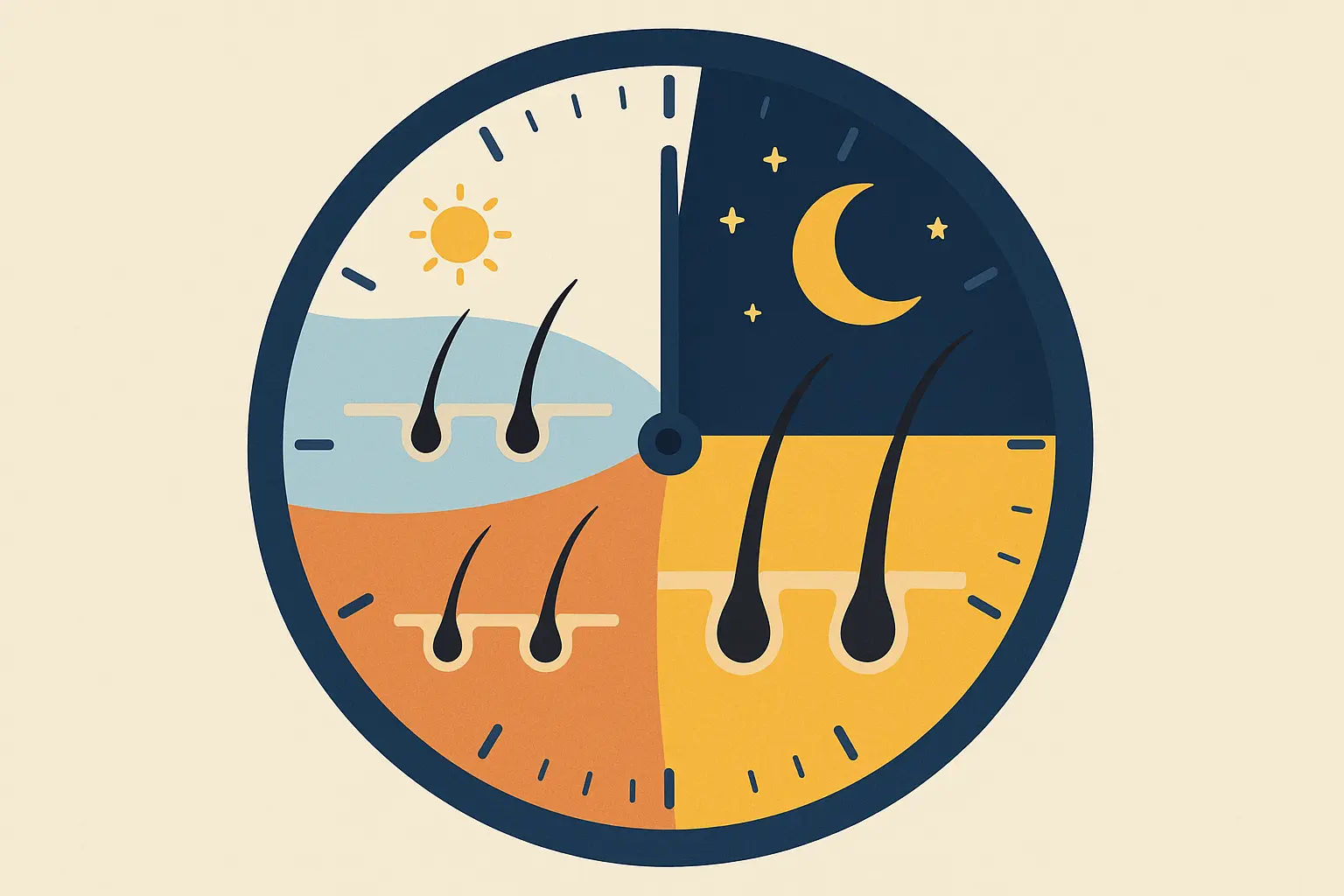
The 3 AM Growth Window You’re Missing
Peak hair follicle activity happens during deep sleep hours when your growth hormone levels are highest and all those cellular repair processes are most active. Taking B12 in the evening ensures maximum availability during this critical window when your hair is actually trying to grow.
A lot of people notice improvements in their morning hair shedding patterns when they optimize their B12 timing around these natural rhythms. Here’s what I’d suggest to work with your hair’s natural schedule:
- Take B12 injections between 6-8 PM
- Make sure you’re getting adequate sleep (7-9 hours) to support the natural growth cycle
- Pay attention to morning hair shedding as an indicator of how your follicles are doing overnight
- Adjust timing based on how you personally respond
The Supporting Cast: Why B12 Can’t Work Alone for Hair Growth
Okay, here’s where a lot of people get frustrated. B12 doesn’t work in isolation – it operates within this complex network of nutrients and compounds that all need to be working together for healthy hair growth. Understanding these interactions and optimizing the whole system can dramatically improve your results compared to just taking B12 alone.
I’ve seen way too many people get limited results with B12 because they’re missing critical cofactors or have other nutrient deficiencies that basically cancel out B12’s benefits. Recent coverage in “Glamour Magazine” reveals that “more than 11,000 people search for the best vitamins for hair growth every month” and that “50% of women will experience hair loss in their lifetime.” This shows just how many of us are dealing with this, but most people are still thinking about it in terms of single nutrients instead of the whole system.
The Methionine-Cysteine Assembly Line
B12 supports the conversion of methionine to cysteine, which is a critical amino acid for making keratin – that’s the protein that actually makes up your hair. But this whole metabolic pathway can get disrupted by deficiencies in seemingly unrelated nutrients, making your B12 less effective even when your levels look good.
Think of it like an assembly line – if one worker calls in sick, the whole production slows down.
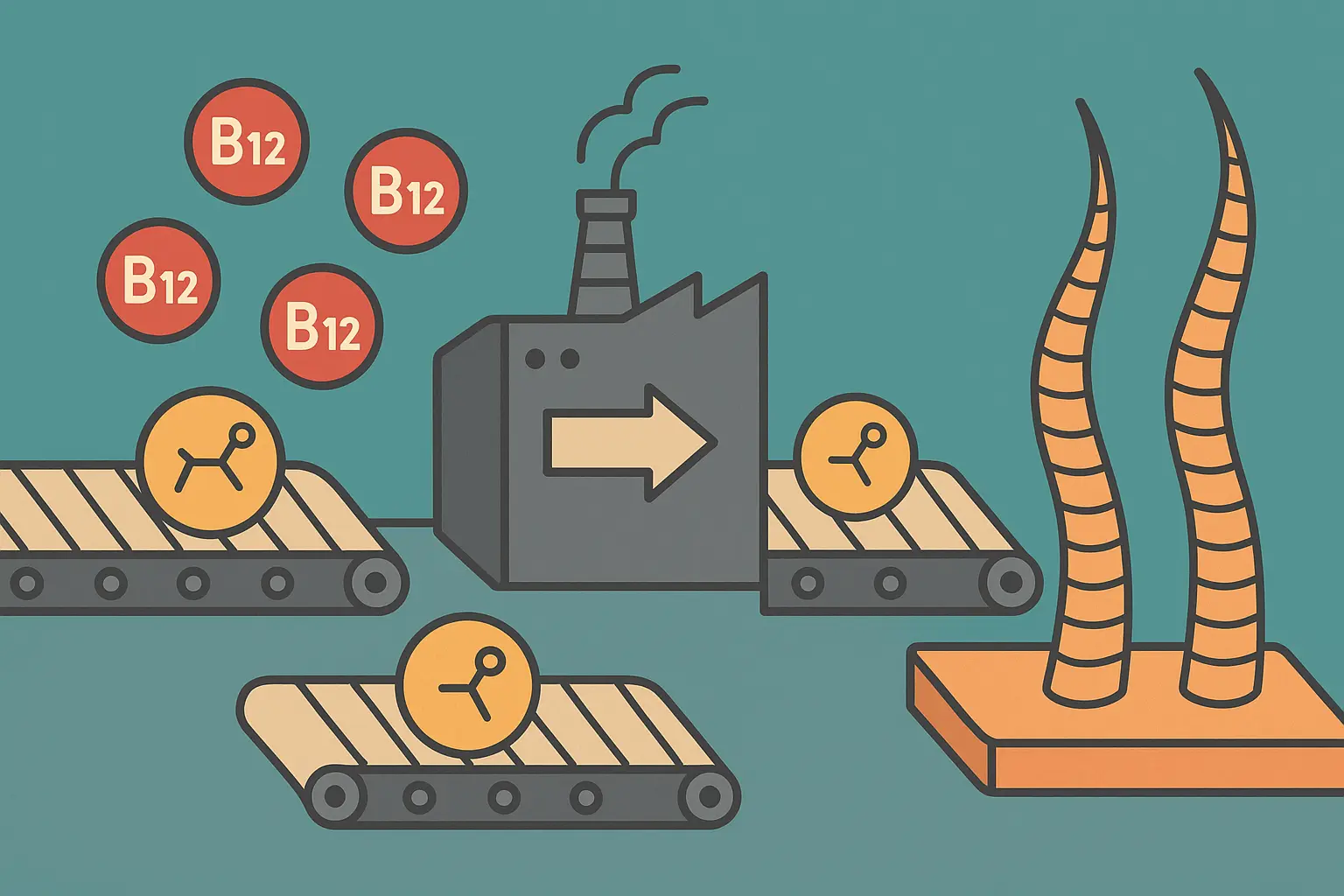
The Molybdenum Bottleneck
Here’s a trace mineral most people have never heard of – molybdenum. A deficiency in this can create a bottleneck in sulfur amino acid metabolism, preventing your body from efficiently converting methionine to cysteine regardless of your B12 status. This mineral is often completely overlooked but can be the limiting factor that prevents B12 therapy from actually working.
I’ve worked with people who had perfect B12 protocols but saw minimal improvement until we addressed their molybdenum deficiency. It’s like having all the right ingredients for a recipe but missing the one thing that makes it all come together.
The Selenium-Glutathione Protection System
Hair follicles are really vulnerable to oxidative stress because of their rapid cell division and high metabolic activity. It’s like they’re working so hard they create a lot of cellular “exhaust.” Selenium-dependent enzymes protect follicles from this damage, while B12 supports the regeneration of reduced glutathione needed for these protective systems.
Without adequate selenium and glutathione support, B12’s benefits can get undermined by ongoing oxidative damage. Here’s how to optimize this whole network:
- Test for molybdenum and selenium status alongside B12
- Consider glutathione supplementation or support
- Make sure you’re getting enough sulfur amino acids through diet or targeted supplementation
- Check your thyroid function, since it affects this entire methionine cycle
The Iron-B12 Competition You Need to Know About
Now this is something that really caught me off guard. Iron and B12 can actually compete for cellular uptake mechanisms, creating a situation where you have adequate levels of both nutrients in your blood, but they don’t translate to adequate levels in your hair follicles.
Hair follicles have really high iron requirements, which can create localized B12 deficiency even when your systemic levels look totally normal. It’s like two people trying to get through the same door at once – they end up blocking each other.
Research confirms that iron deficiency can contribute to hair shedding and thinning, and many supplements combine both nutrients since deficiencies often occur together, but what they don’t tell you is that you need to be strategic about how you address both rather than just taking them together and hoping for the best.
Finding the Ferritin Sweet Spot
Optimal ferritin levels for hair growth (70-100 ng/mL) might require adjusted B12 protocols to ensure you’re getting adequate cellular availability of both nutrients. Many people focus on getting their ferritin up without considering how this affects B12 utilization, or vice versa.
The key is optimizing both nutrients at the same time rather than addressing them one by one. Have you ever noticed that your hair responds differently to B12 depending on your iron status? This competition explains why some people need higher B12 doses when their ferritin levels are optimized.
| Nutrient | Optimal Range for Hair | Signs You Might Be Low | How It Interacts with B12 |
|---|---|---|---|
| Ferritin | 70-100 ng/mL | Lots of shedding, weak hair | Competes for getting into cells |
| Folate | 10-20 ng/mL | Slow growth, premature graying | Needs B12 to actually work |
| Selenium | 70-150 mcg/L | Brittle hair, scalp inflammation | Protects B12-dependent processes |
| Molybdenum | 0.3-1.9 mcg/L | Poor keratin formation | Required for sulfur amino acid stuff |
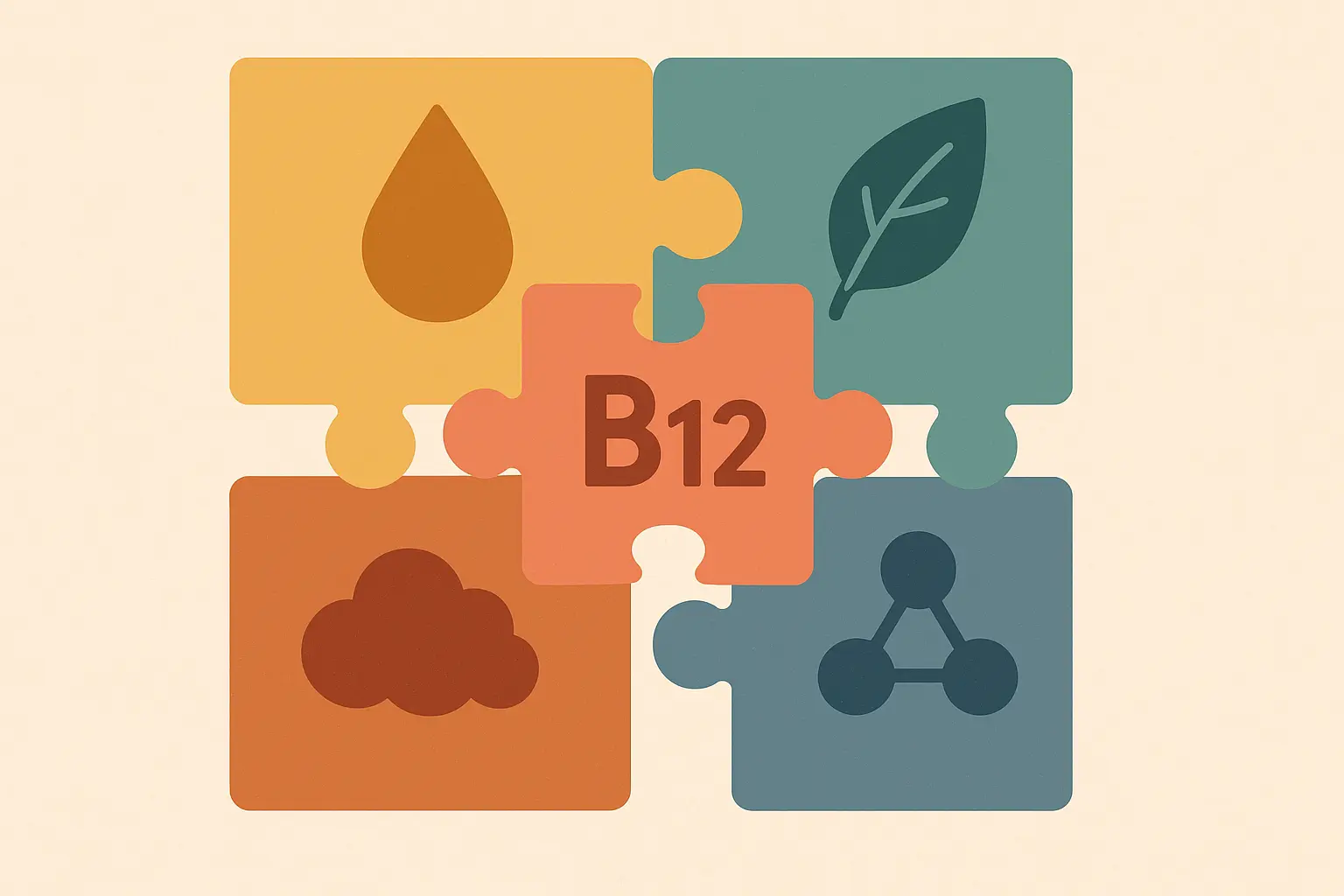
Let me tell you about Lisa’s experience. She had ferritin levels of 15 ng/mL and normal B12 blood levels, but was still losing tons of hair. After raising her ferritin to 85 ng/mL, her hair loss actually got worse temporarily because the increased iron uptake created functional B12 deficiency at the cellular level. Only when she added methylcobalamin injections alongside iron supplementation did her hair start recovering.
B12 Hair Growth Optimization Checklist:
- Test serum B12, homocysteine, and methylmalonic acid levels
- Check ferritin, folate, selenium, and molybdenum status
- Consider MTHFR genetic testing if there’s family history of variants
- Choose methylcobalamin over cyanocobalamin for supplementation
- Time B12 for evening hours (6-8 PM)
- Keep track of morning hair shedding patterns as a progress indicator
- Address any absorption issues (medications, digestive health)
- Make sure you’re getting adequate sleep (7-9 hours) to support follicle activity
- Look for new growth at 12-16 week intervals
- Adjust dosing based on how you personally respond
Enov.one’s personalized B12 injection protocols address a lot of these complex interactions through their comprehensive approach. Their B12 injection programs work with hair follicle metabolic cycles while bypassing those absorption issues we talked about. The company’s genetic testing can identify variants like MTHFR that affect how you process B12, and their holistic approach makes sure synergistic nutrients are optimized alongside B12 for maximum hair health benefits.

Final Thoughts
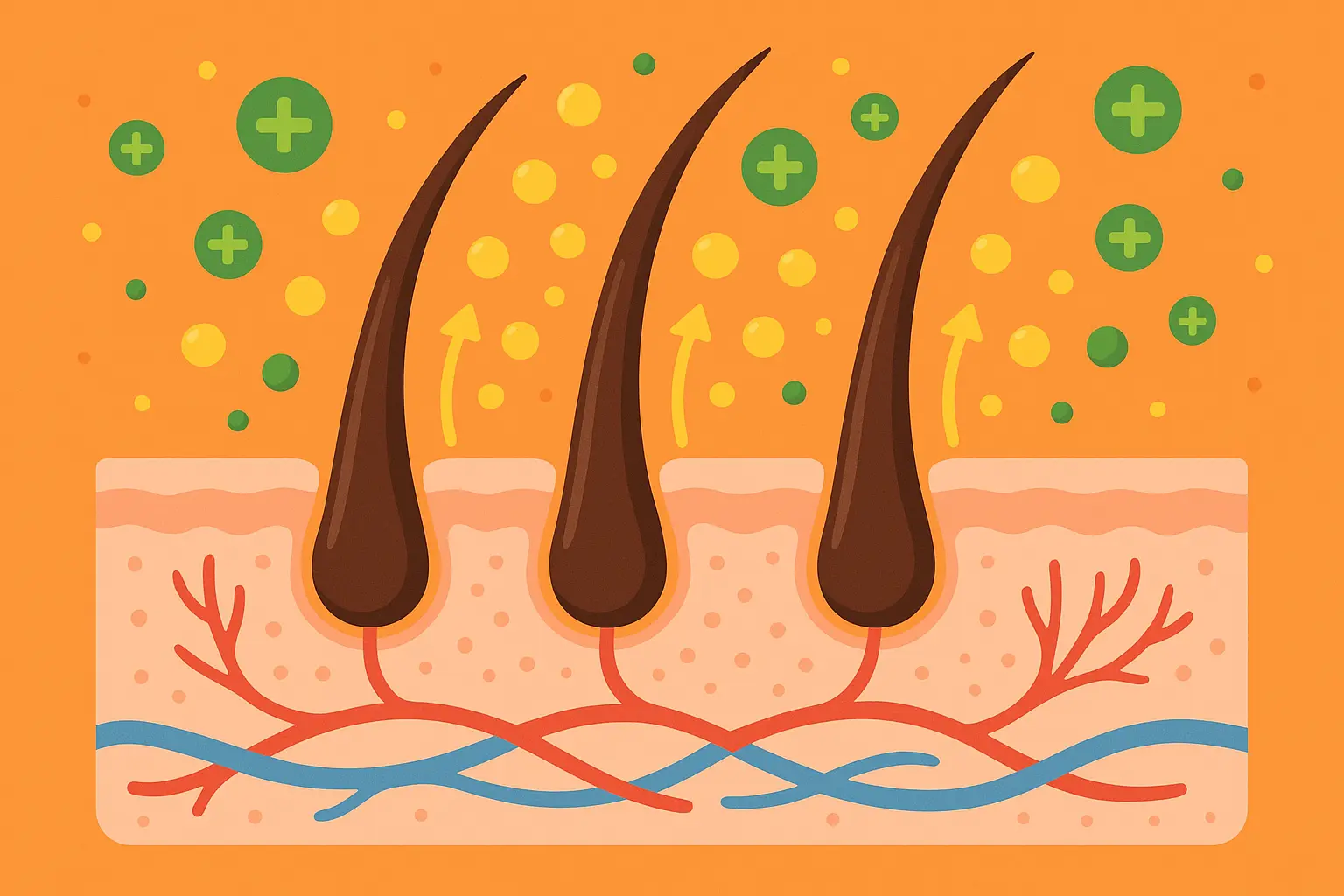
Look, the relationship between B12 and hair health goes way deeper than just “take some B12 and hope for the best.” We’re talking about this complex cellular communication network involving methylation cycles, genetic switches, blood vessel health, and nutrient teamwork that most people never even think about when they ask “is B12 good for hair?”
What really gets me frustrated is how many people struggle with hair issues while having “normal” B12 blood levels, not realizing that their hair follicles might be starving at the cellular level. The timing stuff, delivery methods, and supporting nutrients all matter way more than most healthcare providers want to acknowledge.
If you’ve been disappointed with B12 supplementation for hair health, the issue probably isn’t whether B12 works – it’s whether you’re addressing the full picture. The methylation cycle, homocysteine levels, absorption issues, genetic variants, and nutrient interactions all play crucial roles that those generic drugstore approaches completely miss.
Your hair deserves better than just throwing random B12 supplements at the problem and hoping something sticks. Understanding these cellular mechanisms gives you the power to make informed decisions about your hair health strategy instead of just guessing and getting frustrated when things don’t work.
